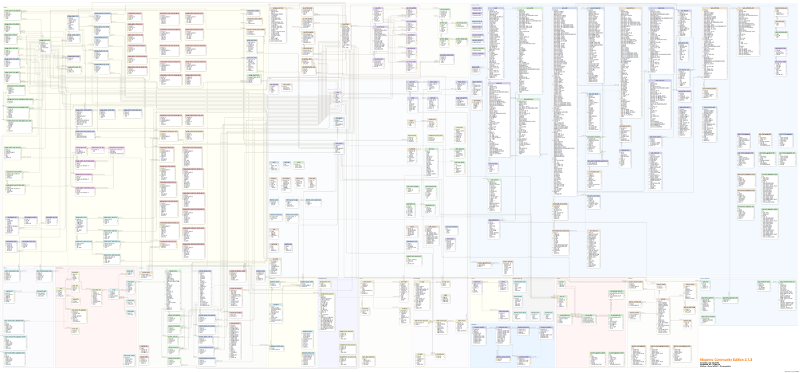About a year ago I released the Magento CE 1.9.2.2 database diagram and since then, also with the increasing popularity of Magento 2, there have been requests for a Magento 2 database diagram.
This is the database diagram of a fresh CE 2.1.3 installation.
Some statistics (because I love numbers):
- Magento CE 2.1.3 consists of 315 tables (that’s 18 tables less compared to Magento CE 1.9.2.2)
- 1 table starts with core_* (compared to 19 tables in M1)
- 38 tables start with sales_* (compared to 47 tables in M1)
- 76 tables start with catalog_* (compared to 84 tables in M1)
What’s new?
These are the changes I found so far:
Changes/Renames:
- core_resource can was renamed to setup_module
- the core_* prefix was removed: core_layout_link is now layout_link, core_layout_update is now layout_update
- sales_flat_*/sales_* was removed as prefix. For example sales_flat_order is now sales_order.
- setup_module (former core_resource)
- authorization_role (former admin_role)
- authorization_rule (former admin_rule)
New tables:
- admin_system_messages
- customer_grid_flat
- design_change
- design_config_grid_flat
- eav_attribute_option_swatch
- googleoptimizer_code
- password_reset_request_event (part of the Security module)
- quote_id_mask
- reporting_* tables (for NewRelic Reporting)
- sales_sequence_meta
- sales_sequence_profile
- sequence_order_0 (SalesSequence module manages sequences for next system entities and flows for order, invoice, shipment and credit memos)
- sequence_order_1
- sequence_invoice_0
- sequence_invoice_1
- sequence_shipment_0
- sequence_shipment_0
- sequence_creditmemo_0
- sequence_creditmemo_1
- theme
- theme_file
- ui_bookmark
Removed (=tables you won’t find in the M2 database diagram any more):
- admin_assert
- All api_* tables
- core_email_queue
- core_email_queue_recipients
- permission_block
- permission_variable
- All tag_* tables (no more Mage_Tag!)
- wee_discount
Database diagram
Here’s the DB diagram of a fresh Magento Community Edition 2.1.3.
I tried to keep at least the bigger parts of the DB diagram similar to the version of the CE 1.9.2.2 db diagram to make it easier to understand what has changed.
The big yellow part on the left are the catalog tables, the big blue part on the right are the sales tables. Inbetween them there are the EAV tables and core tables. The smaller modules are on the bottom part of the db diagram.
If you like it, go an upvote my answer(s) on Magento Stackexchange:

Awesome Work! an you point me to the high res image of Magento Community Edition 2.1.3 database diagram. While this is good really cannot make out anything with this resolution
Just click the image above, this will link you to https://anna.voelkl.at/wp-content/uploads/2016/12/ce2.1.3.png
Is there an actual file for this because it would be nice to keep one in workbench
By file I mean like a workbench file instead of an image
I created it with DbSchema so I don’t have a file for MySQL Workbench.
Hi Anna
I greatly a appreciate this , Just what i needed .Doing some magento 1 to 2 swap
this information will be much of help.
Do you have a work email ?
Thanks alot for the effort
Hi Anna,
Great job. We are actually about to migrate to Magento. It will be quite a ride. I was wondering if we could find the Database Diagram in excel. It would be pretty beneficial to get that.
Thanks
Hi,
there is no excel version of the diagram available.
Hi Anna, this is an amazing diagram, thank you very much for making it.
Do you perhaps have a pdf version so that the field names can be searched?
Thanks again
Roland
thanks
Hi,
I found the ER diagram and the project file of Magento CE2.1.3 here:
https://soft-builder.com/magento-data-model-how-to-get-magento-database-diagram/
The project file ERB can be opened with ERBuilder Data Modeler (Free Trial of 15 days)
Hope it helps.
Hey Anna. Just wanted to say thank you for making this!
Much appreciated!
Hi, I am sorry but I don’t have the original file any more.
I suggest you do an export of an existing Magento shop so you can search through the SQL dump 🙂
Anna
Indeed, I did a similar approach. The hard work in my diagram was to cluster and arrange the tables in the specific areas (catalog, eav,…).
If that’s not needed, this approach mentionend in the link will do well!